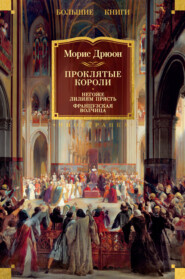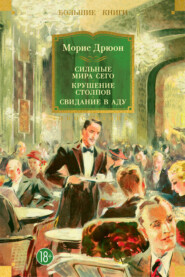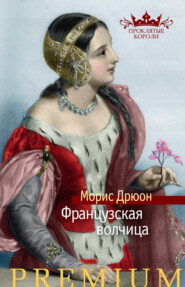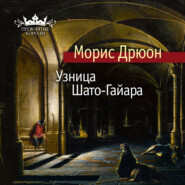По всем вопросам обращайтесь на: info@litportal.ru
(©) 2003-2024.
✖
The Iron King
Автор
Год написания книги
2019
Настройки чтения
Размер шрифта
Высота строк
Поля
‘Take the prisoners back to the Temple,’ he shouted to Alain de Pareilles. ‘I shall go at once to inform the King.’
He took four sergeants-at-arms with him by way of escort.
5 (#ulink_bcbd069f-aec4-5cdd-b4eb-33203f264b7d)
Marguerite of Burgundy, Queen of Navarre (#ulink_bcbd069f-aec4-5cdd-b4eb-33203f264b7d)
WHILE ALL THIS HAD been going on, Philippe d’Aunay had reached the Hôtel-de-Nesle. He had been asked to wait in the ante-room of the Queen of Navarre’s private apartments. Time lagged. Philippe wondered whether Marguerite was detained by visitors or whether, quite simply, she was taking pleasure in keeping him waiting. It would be in character. And, quite possibly, after an hour or so, she would send to say that she could not see him. It made him furious.
Three years ago, when their liaison had begun, she would not have behaved like this. Or would she? He could no longer remember. He had succumbed to the delights of a new relationship in which vanity played as important a part as love. At that time he would have danced attendance for five hours at a stretch merely to catch sight of his mistress, to kiss her hand, and hear a whispered word promising a meeting.
But times had changed. The difficulties, which are the savour of a nascent love-affair, become intolerable after three years, and sometimes passion dies by the very thing that has brought it to birth. The continued uncertainty of meeting, appointments cancelled, the obligations of the Court, to which had to be added the eccentricities of Marguerite’s own character, had aroused in Philippe a sense of exasperation, which could find expression only in anger and in making new demands upon her.
Marguerite seemed to take things much more easily. She enjoyed the double pleasure of deceiving her husband and torturing her lover. She was one of those women who can find satisfaction in love only through the spectacle of the suffering they inflict, till even that becomes a bore.
Not a day passed but Philippe told himself that a great love could find no satisfaction in adultery, and that he did not swear to break it off.
But he was weak, cowardly, and enmeshed. Like a gambler who doubles his stake, he followed up his fantasies of the past, his vain present, all the time he had wasted, and his former happiness. He lacked the courage to rise from the table and say, ‘I’ve lost enough.’
And there he was, leaning against a window-frame, waiting to be told to come in.
To alleviate his impatience, he was watching the coming and going of the grooms in the courtyard of the house. They were leading out the horses to exercise on the little Pré-aux-Clercs near by. He watched the porters delivering sides of meat and baskets of vegetables.
The Hôtel-de-Nesle consisted of two distinct buildings: the Hôtel proper, which was of recent construction, and the tower erected under Philippe-Auguste, at the period when the town wall passed that way, in order to make a counterpart to the Tower of the Louvre on the left bank of the Seine. Six years earlier, Philip the Fair had bought the whole site from the Count Aumary de Nesle, and had granted it as a residence to his eldest son, the King of Navarre.
Until then the tower had been used as a guardroom or garrison. It was Marguerite who had had it furnished as a retreat in which to meditate, or so she said, upon her Books of Hours above the flowing river. She declared that she needed solitude, and since she was known to be eccentric, Louis of Navarre had not been unduly surprised. In reality, she had desired this amenity merely for the purpose of receiving the good-looking Aunay the more easily.
For the latter, this had been a source of unparalleled pride. For him alone a Queen had turned a fortress into a love-nest.
And then, when his elder brother Gautier d’Aunay had become the lover of Blanche, the tower had also become the secret meeting-place of the new couple. The pretext had been easily conceived: Blanche merely came to visit her cousin and sister-in-law; and Marguerite had no wish but to be obliging.
But now, at this actual moment, as Philippe looked out upon the huge sombre tower, with its conical roof and high, narrow windows, overlooking the river, he could not help wondering whether other men had not shared those furtive embraces and tumultuous nights. Even to those who thought they knew her best, Marguerite was so unaccountable! And these last five days without a sign from her, when every circumstance lent itself to a meeting, were they not proof?
A door opened and a lady-in-waiting asked Philippe to follow her. His lips were dry and he felt a constriction about the heart, but he was determined not to let himself be put off this time. He walked down a long corridor and then the lady-in-waiting disappeared, while Philippe entered a low-ceilinged room, crowded with furniture, impregnated with that heady scent he knew so well, essence of jasmin brought by merchants from the Orient.
It took Philippe a moment to accustom himself to the twilight and heat of the room. A tree-trunk was smouldering above a heap of tinder-wood upon the great hearth.
‘Madam …’ he said.
A voice came from the end of the room, a rather hoarse and sleepy voice.
‘Come over here, Messire.’
Was Marguerite alone? Was she daring to receive him in her room, without witnesses, when the King of Navarre might be in the vicinity?
He felt at once relieved and disappointed: the Queen of Navarre was not alone. She was reclining upon her bed, while an elderly woman-of-the-bedchamber, half-hidden by the curtain, was engaged in polishing her toe-nails.
Philippe went forward and in a courtly tone, which was at variance with his expression, announced that the Countess of Poitiers had sent him to ask after the Queen of Navarre, remit her compliments and deliver a present.
Marguerite listened without moving. Her beautiful naked arms were folded beneath her head and her eyes were half closed.
She was small, black-haired and olive-skinned. It was said that she had the most beautiful body in the world, and she was well aware of it.
Philippe looked at her round, sensual mouth, her short chin, her half-naked throat, and her plump, elegant legs revealed by the woman-of-the-bedchamber.
‘Put the present on the table, I’ll look at it in a moment,’ said Marguerite.
She stretched and yawned. Philippe saw her pink tongue, the roof of her mouth and her little white teeth. She yawned like a cat.
As yet, she had not once turned her eyes in his direction. He made an effort to keep himself under control. The woman-of-the-bedchamber looked covertly at Philippe in curiosity. He thought that his anger must be too apparent. He had never seen this particular duenna before. Was she newly in Marguerite’s service?
‘Am I to take back a reply to the Countess?’ he asked.
‘Oh!’ cried Marguerite, sitting up, ‘you’re hurting me, woman.’
The woman murmured an excuse. Marguerite at last consented to look in Philippe’s direction. She had beautiful dark, velvety eyes, which seemed to caress everyone and everything they looked upon.
‘Tell my sister-in-law of Poitiers …’ she said.
Philippe had moved to escape being observed by the woman-of-the-bedchamber. With a quick gesture of his hand he signed to Marguerite to send the old lady away. But Marguerite appeared not to understand; she smiled, but not in Philippe’s direction; she seemed to be smiling into the void.
‘On the other hand, perhaps not,’ she went on. ‘I’ll write her a letter for you to give her.’
Then, to the woman-of-the-bedchamber, she said, ‘That will do for the present. I must dress. Go and prepare my clothes.’
The old woman went into the next room but left the door open. Philippe realised that she was watching him.
Marguerite got up and, as she passed him, whispered almost without opening her lips, ‘I love you.’
‘Why haven’t I seen you for five days?’ he asked as quietly.
‘Oh, how pretty it is,’ she cried, unpacking the girdle. ‘What good taste Jeanne has, and how I love her present!’
‘Why haven’t I seen you?’ Philippe repeated in a low voice.
‘It’s the very thing to go with my new purse,’ Marguerite went on. ‘Messire d’Aunay, can you spare the time to wait while I write a word of thanks?’
She sat down at the table, took a goose’s quill and a piece of paper
and signalled Philippe to draw near.
She wrote so that he could read the word over her shoulder: ‘Prudence.’
Then to the woman in attendance, who could be heard in the neighbouring room, she cried: ‘Madame de Comminges, will you fetch my daughter? I haven’t given her a kiss all morning.’
The woman went out.
‘You’re lying,’ said Philippe. ‘Prudence is a good pretext for getting rid of one lover in order to receive others.’

















